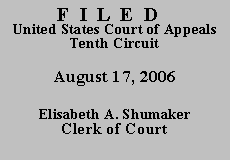

| DERRAL SCHRODER, | Nos. 05-1487 & 06-1057
(Consolidated Appeals)
(D.C. No. 05-CV-1836-OES) (D. Colo.) |
On September 22, 2005, Schroder filed a notice of removal in district court seeking to remove his state criminal case from the Baca County Court in Springfield, Colorado to the U.S. District Court for the District of Colorado. Less than a week later, on September 28, 2005, he filed a verified complaint in district court suing Michael Porter and James Howard Frasher, Baca County judges, as well as Larry C. Porter, the assistant district attorney that prosecuted Schroder's case. In the complaint, Schroder alleges that Attorney Porter and Judge Frasher failed to disqualify themselves from his case, and Judge Porter failed to promptly recuse himself. Because Schroder asserted that his civil rights were violated, the district court treated the complaint as a 42 U.S.C. § 1983 action. On October 3, 2005, Schroder filed a motion seeking to disqualify Magistrate Judge O. Edward Schlatter, who had been assigned to both actions.
The district court found no legitimate basis for removal and summarily remanded Schroder's criminal case to Baca County Court. Finding that Schroder's § 1983 suit sought monetary damages against defendants immune to such relief, the district court dismissed the action under 28 U.S.C. § 1915(e)(2)(B) as legally frivolous. Finally, because Schroder failed to advance any legal basis for Magistrate Judge Schlatter's disqualification, the court denied his motion for recusal.
An order remanding a case to the state court from which it was removed is ordinarily not reviewable on appeal. See 28 U.S.C. § 1447(d). Section 1447(d) provides an exception to this general rule for cases removed pursuant to 28 U.S.C. § 1443, however, Schroder's case does not fall within this category. Accordingly, we will not consider his appeal of the district court's remand.
We review a dismissal pursuant to § 1915(e)(2)(B) de novo. See Perkins v. Kansas Dep't of Corr., 165 F.3d 803, 806 (10th Cir. 1999). Section 1915(e)(2)(B)(iii) requires a court to dismiss a case proceeding in forma pauperis (IFP) where the plaintiff seeks monetary relief against a defendant who is immune from such relief. Schroder sought damages from two state court judges and an assistant district attorney for actions they undertook in their official capacities. Judges are absolutely immune from monetary liability for actions taken in their judicial capacity unless they clearly acted without jurisdiction. See Mireless v. Waco, 502 U.S. 9, 11-12 (1991). Similarly, prosecutors are immune from suits for civil damages when initiating and presenting a criminal case. See Imbler v. Pachtman, 424 U.S. 409, 431 (1976). We therefore conclude that the district court properly dismissed Schroder's § 1983 suit as frivolous.
Whether to recuse is a decision committed to the discretion of the presiding judge. United States v. Burger, 964 F.2d 1065, 1070 (10th Cir. 1992). We review the denial of a motion for recusal for abuse of discretion. Id. A judge, or in this case a magistrate judge, must recuse himself "in any proceeding in which his impartiality might reasonably be questioned." 28 U.S.C. § 455(a). This is an objective test, based on a judge's "outward manifestations and reasonable inferences drawn therefrom," rather than the judge's actual state of mind. Nichols v. Alley, 71 F.3d 347, 351 (10th Cir. 1995). A defendant may request recusal by filing an affidavit with the court stating the reasons the defendant believes the judge is personally biased or prejudiced. 28 U.S.C. § 144. We accept the facts alleged in the affidavit as true for the purpose of review. See Glass v. Pfeffer, 849 F.2d 1261, 1267 (10th Cir. 1988).
The only possible ground for recusal Schroder alleges is that Magistrate Judge Schlatter sentenced him to three and one-half years' imprisonment in 1991 and was reversed on appeal. However, "judicial rulings alone almost never constitute a valid basis for bias." Liteky v. United States, 510 U.S. 540, 555 (1994). A prior ruling will suffice to show bias only where it derived from an extrajudicial source, or where the judge's remarks reveal a high degree of favoritism or antagonism. Id. Schroder has failed to allege any facts that suggest Magistrate Judge Schlatter's sentencing order met either of these criteria. As such, we conclude that the district court did not abuse its discretion in denying Schroeder's motion for recusal.
Finally, Schroder seeks leave to proceed IFP on this appeal. Because he was granted permission to proceed IFP by the district court, his IFP status continues on appeal and his request is moot.
For the foregoing reasons we AFFIRM the orders of the district court and DISMISS Schroder's appeals.
ENTERED FOR THE COURT
Carlos F. Lucero
Circuit Judge
*. The case is unanimously ordered submitted without oral argument pursuant to Fed. R. App. P. 34(a)(2) and 10th Cir. R. 34.1(G). This order and judgment is not binding precedent, except under the doctrines of law of the case, res judicata, and collateral estoppel. The court generally disfavors the citation of orders and judgments; nevertheless, an order and judgment may be cited under the terms and conditions of 10th Cir. R. 36.3.
1. This Court consolidated Schroder's appeals for the purposes of briefing, record, and submission in an order dated February 27, 2006. Schroder submitted a document, entitled "Response to Lucero, Hartz and O'Brien Order dated Feb. 27, 2006," to this Court following the consolidation. Even when construed liberally, see Hall v. Bellmon, 935 F.2d 1106, 1110 (10th Cir. 1991) ("A pro se litigant's pleadings are to be construed liberally . . . ."), the document contains no objection to the consolidation order, and we do not consider it further.